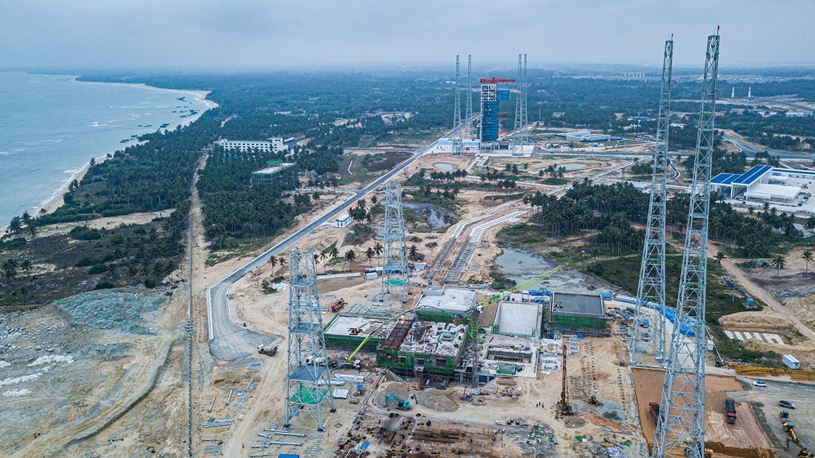"It is sad neither party can find someone suitable to be president," said Missouri Republican Tom Waters.
by Xiong Maoling, Sun Ding
WASHINGTON, March 10 (Xinhua) -- The 2024 U.S. presidential election has entered a new phase as both U.S. President Joe Biden, the Democratic incumbent, and former President Donald Trump, the presumptive Republican nominee, held campaign rallies in the swing state of Georgia recently to step up their reelection effort.
The two launched attacks against each other while having deep political grievances. They also have significant differences in their major policy positions. Analysts believe that as the election campaign unfolds, it may further intensify political disputes and public divisions in the country, potentially leading to more chaos.
FIGHT IS ON
"Trump and I have a very different value set," Biden told supporters in Atlanta, Georgia, noting that if Trump returns to the White House, the United States will be filled with "resentment, revenge and retribution." Additionally, Biden criticized Trump's positions on issues such as abortion, taxes, and immigration.
On the same day, Trump held a rally in Rome, Georgia, where he attacked Biden on immigration and border security, accusing him of allowing illegal immigration from the southern border, saying Biden's "crime" will never be forgiven. At the rally, Trump also mocked Biden's mannerisms.
Georgia, located in the southeastern United States, was won by Trump in the 2016 presidential election. Four years later, Biden narrowly claimed victory in the state. According to the RealClearPolitics website, Georgia is one of the swing states this year, which typically has a critical impact on the outcome of the U.S. presidential election.
Before they visited Georgia, two significant milestones occurred in the U.S. presidential election this year: one being the "Super Tuesday" primaries in multiple states, where both Biden and Trump achieved considerable victories in their respective party primaries, thereby expanding their lead and essentially securing their parties' presidential nomination.
The other important event is Biden's State of the Union address, in which he indirectly criticized Trump during this nationally televised speech, accusing "his predecessor" of undermining American democracy as he braces for a rematch. Trump reacted and labeled Biden as a threat to American democracy.
U.S. media predicts that Trump could clinch the Republican presidential nomination as early as March 12. On that day, four states -- Georgia, Hawaii, Mississippi, and Washington -- will hold Republican primaries. Meanwhile, Biden is expected to secure the Democratic presidential nomination as early as March 19.
"A rematch means the stakes are high for America," Brookings Institution Senior Fellow Darrell West told Xinhua. "The visions Trump and Biden have for the country are radically different," he said.
EACH HAS WEAKNESSES
In recent national polls, Trump is slightly ahead of Biden, and he leads in most swing states' polls. Biden has stated that these polls don't mean anything, and it is too early to conclude.
An analysis by Politico suggests that Trump is "gaining momentum," but he faces issues such as campaign funding, party unity, and a series of legal troubles.
Trump is embroiled in four criminal cases, facing a total of 91 felony charges, and has recently been fined hundreds of millions of dollars in two civil cases. He denies all charges and accuses Biden and the Democratic Party of ongoing "political witch hunts" against him.
Instead of weakening Trump's base, these cases and related major developments have helped him gain support within his party and raise more funds. However, a recent poll, released by Bloomberg and Morning Consult, found that 53 percent of voters in key swing states would refuse to vote for Trump if any of the four criminal trials he is facing results in a conviction.
"It's likely that an actual conviction will alienate exactly the voters he needs to either vote for him or stay home on election day," Christopher Galdieri, a political science professor at Saint Anselm College, told Xinhua.
On his path to reelection, Biden faces challenges such as low approval ratings and his advanced age. Most Americans do not approve of his handling of the economy, immigration, and border security.
Adding insult to injury, Biden's recent comments on immigration and response to the Israeli-Palestinian conflict have also sparked dissatisfaction among some within his party. In the Michigan Democratic primary in late February, over 100,000 people voted for the "uncommitted" option, protesting against the Biden administration's perceived bias in the recent Israeli-Palestinian conflict and urging the U.S. government to stop funding the war and call for a ceasefire.
Biden has attempted to downplay concerns and doubts about his physical condition during his State of the Union address. His speech was noticeably more emotional and sharp-worded than usual.
An article in USA Today, however, suggests that one speech is not enough to dispel American voters' concerns about Biden's age and his ability to serve another four years.
"POOR CHOICES ALL AROUND"
The Washington Post noted that the 2024 general election, which has kicked off in earnest, is promising to be "the longest, most expensive and, perhaps, most divisive presidential race in recent memory."
According to a new ABC News/Ipsos poll, Americans are split on who they trust to do a better job leading the country, with 36 percent trusting Trump and 33 percent trusting Biden. Meanwhile, some 30 percent trust neither.
After the battles on Super Tuesday, Nikki Haley, former U.S. ambassador to the United Nations, announced her withdrawal from the presidential race. At Haley's numerous campaign events, Xinhua reporters encountered many bewildered and concerned voters. Some of them didn't fully agree with her policy positions and expressed doubts about her qualifications for the presidency. However, their support for Haley reflected a strong desire for "alternative" options.
At a Nikki Haley campaign event in Tysons, Virginia, in late February, an independent voter who declined to share his name told Xinhua that he supports Haley because "the country needs change."
"Neither the current president nor the past president offer what they should be with the requirements of the job. They have lost their perspective," he said, calling himself "an American patriot."
Missouri Republican Tom Waters told Xinhua that he thinks voters have poor choices all around. "It is sad neither party can find someone suitable to be president," he said.
James Hester, an independent voter in South Carolina, said he really doesn't want a rematch. "I think both of them should bow out gracefully," he said.
"The majority is unhappy that this is the best the system can offer," Clay Ramsay, a researcher at the Center for International and Security Studies at the University of Maryland, told Xinhua.
"The rematch will heighten the sense that the system isn't working for ordinary people," Ramsay said. ■











